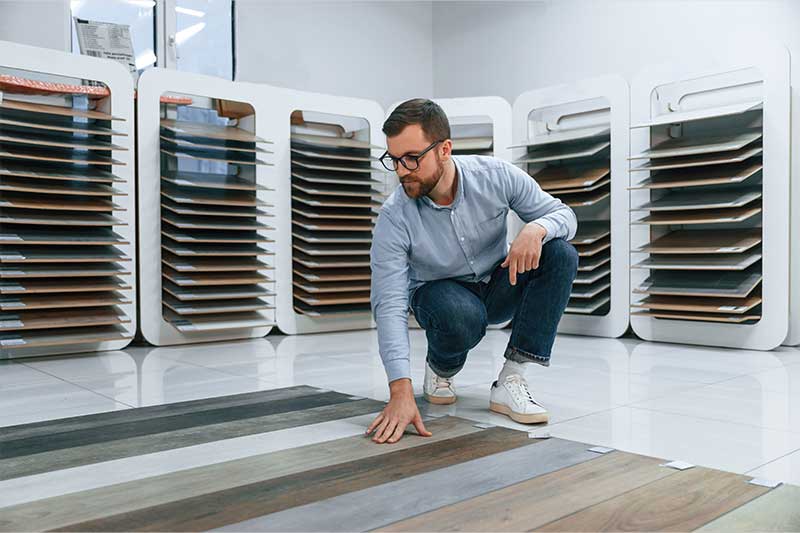As environmental awareness grows, homeowners and builders are increasingly seeking sustainable materials for their projects. Among the many flooring options available, Stone Plastic Composite (SPC) flooring stands out as an eco-friendly choice that combines durability, aesthetics, and sustainability. In this post, we will explore the sustainability of SPC products and why they are a responsible flooring option for conscious consumers.
Understanding SPC Flooring
SPC flooring is composed of a blend of limestone and polyvinyl chloride (PVC), creating a rigid core that is both strong and waterproof. It features a high-resolution printed design layer and a protective wear layer, making it visually appealing and functional. This unique composition not only provides the look of natural materials but also offers several environmental benefits.
Made from Recyclable Materials
One of the key sustainability aspects of SPC flooring is its use of recyclable materials. The primary component, PVC, is recyclable, and many manufacturers source their limestone from sustainable quarries. This reduces the carbon footprint associated with production and helps conserve natural resources.
Additionally, SPC flooring can often be recycled at the end of its life cycle, contributing to a circular economy and minimizing waste in landfills.
Low Emissions and Safe Indoor Air Quality
SPC flooring is typically free from harmful chemicals such as formaldehyde, making it a healthier choice for indoor environments. Many SPC products are certified for low emissions, ensuring that they contribute to better indoor air quality. This is especially important for families with children, pets, or individuals with sensitivities to allergens.
By choosing SPC flooring, homeowners can create a healthier living space without sacrificing style or performance.
Durability and Longevity
The durability of SPC flooring also contributes to its sustainability. The rigid core is resistant to impacts, scratches, and moisture, making it an excellent choice for high-traffic areas. Unlike traditional hardwood, which may need to be replaced or refinished, SPC flooring can last for decades with minimal upkeep.
This longevity not only reduces the need for replacements but also lessens the environmental impact associated with manufacturing and disposing of flooring materials.
Energy-Efficient Production Processes
Many SPC flooring manufacturers are adopting energy-efficient production methods to minimize their environmental impact. By utilizing advanced technologies and optimizing their processes, they can reduce energy consumption and greenhouse gas emissions during production.
This commitment to sustainability not only benefits the environment but also aligns with the growing demand for eco-friendly products in the construction industry.
Water Resistance and Reduced Maintenance
SPC flooring’s waterproof properties make it an ideal choice for moisture-prone areas, such as kitchens and bathrooms. Its resistance to water damage means fewer repairs and replacements are necessary over time, further reducing waste.
Moreover, SPC flooring requires minimal maintenance compared to other flooring options. Regular sweeping and occasional damp mopping are typically sufficient, eliminating the need for harsh cleaning chemicals that can harm the environment.
Versatile and Stylish Options
SPC flooring comes in a wide variety of designs, colors, and textures, allowing homeowners to achieve the look they desire without resorting to unsustainable materials like exotic hardwoods. By choosing SPC, consumers can enjoy the aesthetic appeal of natural materials while supporting environmentally friendly practices.
This versatility makes SPC flooring suitable for various design styles, from modern to rustic, enabling homeowners to create beautiful spaces that reflect their personal style.
Cost-Effectiveness and Accessibility
In addition to its environmental benefits, SPC flooring is often more affordable than traditional hardwood or natural stone options. Its combination of durability and low maintenance costs makes it a wise investment for budget-conscious consumers.
By offering a cost-effective solution that doesn’t compromise on quality or aesthetics, SPC flooring encourages more homeowners to choose sustainable options for their renovations and new builds.
Industry Trends Toward Sustainability
As the demand for eco-friendly products continues to rise, the flooring industry is increasingly focusing on sustainable practices. Many manufacturers are investing in research and development to create even more sustainable flooring options, including improved recycling processes and the use of renewable resources.
As a result, SPC flooring is likely to play a significant role in the future of sustainable construction practices, appealing to environmentally conscious consumers and builders alike.


